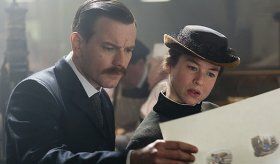|
|
| Tookey's Review |
|
| Pro Reviews |
|
| Mixed Reviews |
|
| Anti Reviews |
|
| Cast |
|
| |
 |
| |
| Released: |
2007 |
| |
|
| Genre: |
ANIMATION & LIVE ACTION
BIOPIC
DRAMA
|
| |
|
| Origin: |
UK |
| |
|
| Colour: |
C |
| |
|
| Length: |
93 |
|
| |
|
| |
|
|
| |
|
|
Do you want a film that’s the opposite of Mel Gibson macho? There emanates from Miss Potter a lingering scent of National Trust pot-pourri, that faint mixture of tweeness and deadly joviality you find in The Vicar of Dibley. For those who like that sort of thing, I would thoroughly recommend the picture. Miss Potter is a gentle tale, sweetly told, and will go down extremely well on television on a wintry Sunday. But I had hoped for more.
|
Reviewed by Chris Tookey
|
|
There is one scene which hints at the picture it might have been: when its heroine sees her illustrations turning against her, and she suffers a nervous breakdown. Suddenly, we see a pain and honesty that too much of the movie lacks.
|
|
For the most part, Renee Zellweger plays the classic children’s author and illustrator, Beatrix Potter, as a more self-assured, less weight-and-man-conscious Bridget Jones. She is defiantly perky at being left “on the shelf” at 32, and wearingly whimsical at the way she refers to her children’s illustrations as “my friends”.
Since Miss Potter was by all accounts quite a difficult woman, the attempt to portray her as a lovable eccentric seems coy, as does the decision to portray her competent and experienced editor Norman Warne (played by Ewan McGregor at his smiliest) as an awkward beginner.
|
|
From very early on, there is a feeling that we are being fed a simplified, childish vision of reality. This is tolerable in a movie aimed principally at the young, such as The Railway Children; but in the biopic of an important artist in her genre, I was hoping for something deeper and more complex, along the lines of Finding Neverland.
Though I was never bored, nor was I ever fully involved. Mainly, this was because there seemed to be so little at stake.
Beatrix Potter’s life was not very eventful, so it’s a mystery why her early career disappointments are glossed over. Her discouraging rejections by six publishers, including the firm that eventually took her on, are omitted. Nor is there anything about her thwarted ambition to have her work as a painter of natural history taken seriously. So there is too little sense of joy in her eventual success.
The attempts by her rich parents (Bill Paterson and Barbara Flynn) to marry her off to the titled gentry are portrayed in a cartoonish montage of unsuitable hooray henries. This crudeness is carried over into the film’s view of her upbringing. Her mother is simply an appalling, social-climbing snob; and although Barbara Flynn is fine delivering lines such as “I wish you wouldn’t let tradespeople into the house – they carry dust” – there’s little depth to her character. She’s just Hyacinth Bucket in crinolines.
Bill Paterson is allowed to be more twinkly and understanding as her barrister father, but there is no clue that his tastes in company were bohemian for the era, or that he knew Lewis Carroll.
Everything seems neatened and – in the case of Beatrix’s burgeoning romance with Norman Warne – neutered. I’m afraid I emitted a little groan of agreement when Phyllida Law, playing Norman’s mother, complained “I’m beginning to feel ill with all this bonhomie”.
This is a film so desperate to charm that, for me at least, it becomes cloying.
|
|
Why did Beatrix Potter choose to write and illustrate for children but not grown-ups? Why are some of her books so much scarier than their innocent reputation? Why did her books have a lasting success that no others have achieved? This film doesn’t answer any of these questions.
|
|
Beatrix Potter didn’t need sanctification. She was a redoubtable woman who was a trailblazer in her art and a pioneer in self-publishing (it was only because she sold so many hundred copies of her first book on her own that she ever found a conventional publisher). She was also a fierce protector of the environment in her beloved Lake District. This film feels like a polite, respectful take on her, rather than a warts-and-all portrayal.
Australian director Chris Noonan is obviously a nice man, and his movie Babe is one of my all-time favourites; but he should have dared to be darker – as should his screenwriter, Richard Maltby. Maltby is mainly a writer of musicals, and there is about Miss Potter the air of a musical whose songs have been taken out. Music and lyrics (especially of the internal monologue variety) might have helped the film delve deeper.
|
|
Without them, this is thin stuff that skates over the surface of the characters’ lives: too concerned to be cute, too little determined to be truthful. Within those limitations, though, it is entirely watchable as elegantly produced, undemanding costume entertainment.
|
|
|
|
|
